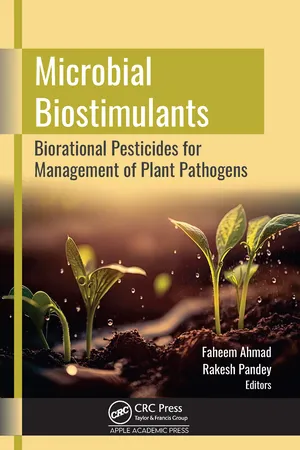
Microbial Biostimulants
Biorational Pesticides for Management of Plant Pathogens
- 446 pages
- English
- ePUB (mobile friendly)
- Available on iOS & Android
Microbial Biostimulants
Biorational Pesticides for Management of Plant Pathogens
About this book
This new volume explores the field of microbial biostimulants, a new and emerging field of plant study that emphasizes the benefit of microbes for plants. Microbial biostimulants can have a positive influence on plant health and growth, enhancing agricultural yield and improving resistance to negative environmental changes with zero harmful discharges.
This book, Microbial Biostimulants: Biorational Pesticides for Management of Plant Pathogens, explores how microbial-based biopesticides can be used for managing pests and plant diseases as well as for the promotion of growth. It looks at the advantages of employing microbial biostimulants over other pest and disease control methods. It also looks at the application of microbial biostimulants as a response to the modern agricultural need for increased productivity and plant health.
This book brings together an extensive collection of information on beneficial microorganisms, including newly introduced microorganisms, their biological activities and specificity, resistance mechanisms to pests, formulation, application in agricultural practices, etc.
Key features:
- Provides a roadmap for using microbial biostimulant practices for pest and disease control as a sustainable approach in agriculture
- Covers the essential aspects of biorational lines for crop stress management
- Looks at the use of microbial biostimulants for management of specific diseases, including root-knot disease, various soil-borne diseases, etc.
- Considers the role of rhizobacteria in plant disease management
Microbial Biostimulants: Biorational Pesticides for Management of Plant Pathogens will be extremely useful for students, academicians, researchers, and policymakers in the field of food security and diverse disciplines of agricultural sciences.
Frequently asked questions
- Essential is ideal for learners and professionals who enjoy exploring a wide range of subjects. Access the Essential Library with 800,000+ trusted titles and best-sellers across business, personal growth, and the humanities. Includes unlimited reading time and Standard Read Aloud voice.
- Complete: Perfect for advanced learners and researchers needing full, unrestricted access. Unlock 1.4M+ books across hundreds of subjects, including academic and specialized titles. The Complete Plan also includes advanced features like Premium Read Aloud and Research Assistant.
Please note we cannot support devices running on iOS 13 and Android 7 or earlier. Learn more about using the app.
Information
Table of contents
- Cover Page
- Half Title page
- Title Page
- Copyright Page
- About the Editors
- Contents
- Contributors
- Foreword
- Preface
- 1 Pests and Diseases: A Global Threat to Plants
- 2 Production of Microbial Biostimulants as a Response to the Modern Agricultural Need for Productivity and Plant Health
- 3 Bacillus Species: Prospects and Applications for the Root-Knot Disease Management
- 4 Arbuscular Mycorrhizal Fungi Protect Vegetable Crops from Pathogenic Root-Knot Nematodes
- 5 Unraveling the Mechanism of Microbial Biostimulants for Controlling Pests and Diseases
- 6 Rhizobacteria as a Potential Bioagent Against Root-Galling Disease in Vegetable Crops
- 7 The Role of Endophytic Bacteria in Plant Immune Responses and Plant Disease Control
- 8 Exploring the Role of Piriformospora indica and Pichia anomala in the Management of Plant Pathogen
- 9 Fungal Endophytes in Plants: Friends or Betrayers?
- 10 Promoting Plant Growth by ACC Deaminase Enzymes Producing Bacterial Endophytes Under Biotic Stress Conditions
- 11 Rhizobacteria-Induced Resistance in Plants Toward Cyst Nematodes
- 12 Microbial and Algal Biostimulants: Modern Approach Toward the Next Generation of Sustainable Agriculture
- 13 Microbiota in Edible Mushroom Industry: Disease Management, Yield, and Quality Improvement
- 14 Microbial Consortia as Plant Biostimulants: Definition, Concept, Categories, and Regulation
- 15 Conditioning Root-Associated Microbiota Through Root-Exudate Metabolites Protects Plants Against Soil-Borne Diseases
- 16 Potential of Entomopathogenic Fungi in Plant Health Management
- Index